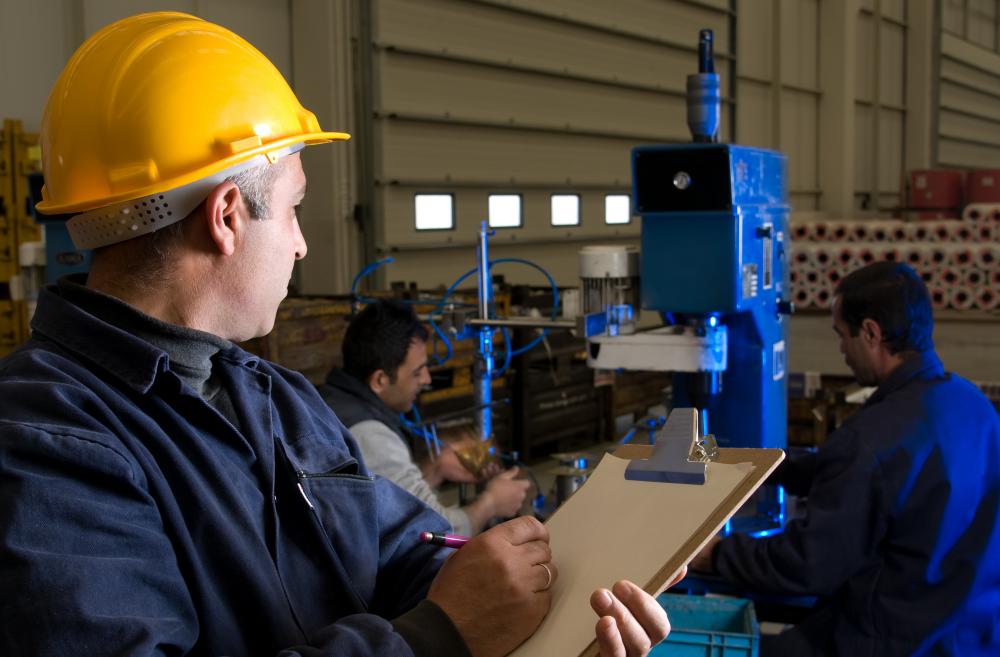At WiseGEEK, we're committed to delivering accurate, trustworthy information. Our expert-authored content is rigorously fact-checked and sourced from credible authorities. Discover how we uphold the highest standards in providing you with reliable knowledge.
What Is the Connection between Personality and Job Performance?
Some psychologists and researchers agree that personality and job performance might be relevant in certain occupations, but the connection could be less important in other jobs. Studies looked at the relationship between agreeableness, conscientiousness, openness to experience, self-esteem, and emotional stability to determine if the two were related. The results showed high correlations in some areas, but found cognitive ability — memory, adaptability, thinking ahead, focus, etc. — often represented a more important factor.
A person with the personality trait of agreeableness might not represent the best candidate for a supervisor's job, research found. His or her personality and job performance might clash if agreeableness makes it hard to delegate tasks and enforce company regulations regarding attendance and productivity. A supervisor who lacks this trait, however, might make unreasonable demands on employees and lose their respect.

Job performance in sales or marketing might be linked to extroversion. An extrovert commonly becomes energized around other people, especially in social situations. These social skills might provide job performance indicators when hiring candidates in these professions. Conversely, if a job requires solitary work, cognitive abilities might be more important for getting the job done.

When looking at conscientiousness — being principled, disciplined, and careful — most studies linked the trait to personality and job performance. A person who acts conscientiously in all facets of life might be more likely to finish a job and complete tasks to the best of his or her ability. In some companies, finishing assigned work represents a more important quality than getting along with coworkers.

Critics of these models believe testing for personality traits should relate to a specific job opening. They also contend tests developed for analyzing personality can be easily faked by an applicant. Some psychologists say only a tenuous link between personality and job performance exists because standard tests used by employers are limited. They propose enhancing test procedures by asking open-ended questions to gain more information about a job applicant's personality.

Other psychologists believe more effective tools for hiring and promoting employees exist. Intensive interviewing tactics might uncover more valuable information about a person's experience and ability than personality testing. Aptitude tests might also provide pertinent information, along with asking applicants for samples of their work.
Some employers use a combination of personality tests and emotional intelligence tests to evaluate prospective employees. Emotional intelligence testing might indicate how an applicant handles anger and his or her degree of self-control. It might also reveal traits that indicate resilience, confidence, and optimism.
AS FEATURED ON:
AS FEATURED ON:
















Discussion Comments
Has anyone here ever heard of the big five personality dimensions? That's what my employers use as a model when hiring new workers.
I actually got to sit down in a meeting with the higher-ups about this before the interview to hire my new coworker. They wanted me to sit in on the interview and give my thoughts later, but first, they wanted to brief me on the model they would be using.
They said they wanted to be on the lookout for openness, conscientiousness, extraversion, agreeableness, and neuroticism. That last one was the only negative dimension that they wanted to check for signs of, and the other dimensions were what they were seeking to find in the potential employee.
I think that job satisfaction factors into job performance, because it can also influence someone's work personality. Someone could be wonderfully agreeable outside of work, but if they are dissatisfied with their job, they could be really hard to deal with in the office.
I used to love my job, because I got along great with my coworkers. After a few of them left, most of the work got dumped on me, and I admit that I became bitter and defensive. I snap more easily now, because I feel that I have to stand my ground and not let people treat me like a doormat.
Anyone who knew me beforehand would tell you that I used to be the sweetest, most easy to get along with person in the office. Now, I have the reputation of being snappy and ill, which is unfortunate, but if I were happier with my job, I could be nicer.
@seag47 – I have interviewed hundreds of people over the years, because I work in human resources. I have seen just about every person suddenly develop a positive personality, whether they really have one or not. So, you can't really tell during interviews, either, unless something really out of the ordinary comes up.
I have found that the best way to tell about a person's demeanor before hiring them is to call up their references. I have had many a former employer tell me about personality issues of an interviewee who seemed just perfect.
Where I work, we believe that personality plays a big part in job performance, so we always seek to hire positive, outgoing people. If we hear from references that a person does not fit this description, we won't hire them, even if they sounded great in the interview.
@ysmina – I totally agree with you. The personality test is only a good indicator of someone mentally capable enough to answer in the way they know will please the future employer.
The only way a test like this would be awesome is if it figured out a way to trick people into showing their true selves. Perhaps if it were designed by a psychiatrist, it could manipulate the mind into revealing itself.
I think that the best way to see someone's personality is just to talk to them face to face. People may be on their best behavior during job interviews, but little red flags do come up here and there.
@ysmina-- I don't know about personality tests, but I do think that employers need a way to learn someone's personality and psychology before hiring someone.
I'm an introvert, I don't like to be social at all. I have struggled a lot in jobs where I was expected to be social. I like to work alone, make decisions alone and set my own pace. When I was forced to be social at work, I was always in a foul mood and was just not satisfied with what I was doing. It definitely affected my productivity.
I don't like work personality tests at all. Not only do they put a job applicant in a lot of stress and apprehension, but it's also not a good way to determine someone's personality. I completely agree with the article that people are not honest in these tests. And I don't blame them because unless the applicant gives the kind of answers the employer wants to see, they can't be hired.
I've figured out that the trick to getting a good result from a job test is to answer the test like a complete extrovert. But this also means that once the applicant is hired, the employer is going to eventually figure out that they are not as extroverted as they appeared to be in the hiring process.
An employer cannot expect to get an objective view of someone's personality from these tests and no applicant is going to be willing to lose out on a job because of it. So I think that personality tests as part of the hiring process should be ditched altogether.
My instructor had us do an exercise in class about this recently.
He put us in groups of five or six people, and then gave us each little papers. Each paper described a type of personality and our task was to do role playing and pretend to be that character. So if someone was given a short-tempered character, that's how he acted during the exercise and someone who was given a calm and agreeable character acted that way.Then we were given an assignment for the group to complete and we had to have team work to do it.
It was such an interesting exercise because it really showed us how different personality types affected team work. At the end of the exercise, we talked about which personality types are the easiest to work with and which did a better job than others. It really gave us a good idea about the connection between personality and job performance. It also got us to think about our own personalities and the type of job positions we would like to have.
I don't know how or where my instructor came up with this exercise, but it was definitely one of the best I did in school.
Post your comments